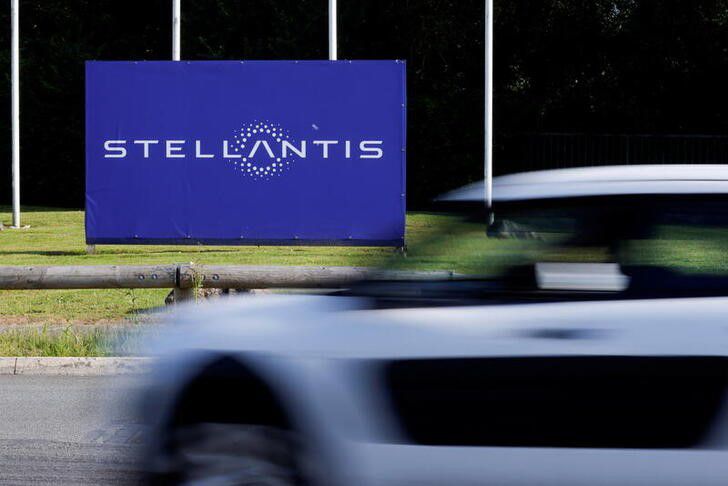Summary
- Stellantis to acquire 21% stake in EV maker Leapmotor
- Firms form JV to build and sell Leapmotor products outside China
- Deal gives Stellantis a crucial foothold in China
- Leapmotor shares tumble 10%, reversing initial 11% jump
HANGZHOU, China, Oct 26 (Reuters) – Stellantis is buying a 21% stake in Leapmotor for $1.6 billion, it said on Thursday, in a reset of its China strategy to focus on electric vehicles after years of poor sales and manufacturing pullback in the world’s biggest auto market.
The Chinese EV maker also announced the formation of a joint venture with Stellantis (STLAM.MI), in which the Chrysler parent will own a 51% stake giving it exclusive rights for the export, sale and manufacturing of Zhejiang Leapmotor Technology’s (9863.HK) products outside Greater China.
The deal, which follows a Volkswagen-Xpeng (VOWG_p.DE), (9868.HK) tie-up announced in July, heralds a new era of automotive alliances in China and reflects how the country is emerging as a global centre of EV technology.
“We haven’t been so successful in China so we prefer to rely on a Chinese partner. To win in China is better to win with a Chinese company,” Stellantis CEO Carlos Tavares told a news conference in the eastern Chinese city of Hangzhou.
“This is a race on speed. We can help to enhance the speed,” he said, seated beside Leapmotor CEO Zhu Jiangming.
Stellantis, formed at the start of 2021 through the merger of France’s PSA with Fiat Chrysler (FCA), has struggled to sell cars in China and has been looking to reshuffle its strategy in the country where it has a joint venture with Dongfeng Motor Group (0489.HK).
The group, whose brands include Fiat and Peugeot, said a year ago it was closing its joint venture that makes Jeeps in China with Guangzhou Automobile Group (601238.SS) after disappointing results.
Stellantis and rivals such as Renault (RENA.PA) have been concerned about growing competition from cheap Chinese electric cars in Europe, a worry shared by the European Commission which has launched an anti-subsidy probe into whether to set tariffs to shield European producers from Chinese EV imports.
Tavares on Thursday criticised the EU probe.
“As we have global issues to face, we have to adopt a global mentality. We do not support a fragmented world. We like competition. To start a probe is not the best way to tackle those questions,” he said.
Asked about how the Leapmotor partnership was different from its tie-ups with Dongfeng and GAC, Tavares said it was better for a Chinese entity to lead the way in the Chinese market.
“In the previous partnerships, Stellantis was not the promoter of the development of the Chinese brands overseas. If we develop Leapmotor overseas, it gives Leapmotor better competitiveness in the Chinese market,” he said.
But concerns about intense competition in China and dilution effect sent shares in Leapmotor down 10% on Thursday, reversing an 11% jump upon the market opening.
More than 40 EV brands are locked in a bruising price war in China, triggered by Tesla’s (TSLA.O) price cuts earlier this year. Despite steep price reductions, EV sales are slowing due to weak consumer demand, putting margin pressure on automakers and their suppliers.
CULTURE ALIGNMENT
The Netherlands-incorporated joint venture is expected to start its export business in the second half of 2024 and its head will be appointed by Stellantis, Leapmotor said. Stellantis would also have two seats on its board of directors.
The partnership will help Stellantis expand its EV lineups and meet a 2030 target of EVs accounting for all of its sales in Europe and half of its U.S. sales.
Zhu, who founded Leapmotor in 2015, said the company’s management had been in contact with many automakers this year and found its culture was aligned with Stellantis.
Leapmotor said last month it was looking to license its EV platforms, battery and motor technology or EV-ready chassis assemblies to established automakers outside China, adding it needed at least a five-fold increase in sales to survive in a consolidating EV industry.
Leapmotor ranked ninth by new energy vehicle sales in China in September, according to data from the China Passenger Car Association.
The deal, which is subject to regulatory approvals, will see Leapmotor issue 194.3 million Hong Kong-listed shares to Stellantis for HK$43.8 per share, a premium of 19% to its last close of HK$36.80.
After the subscription, Stellantis will own about 21.07% of Leapmotor’s total issued Hong Kong shares. Shareholder Dahua (002236.SZ), a surveillance giant that was last year hit with export controls by the U.S., said it would sell its 90 million Leapmotor shares to Stellantis as part of the deal.
($1 = 0.9466 euros)
Reporting by Zhang Yan and Brenda Goh; Additional reporting by Sameer Manekar and Kanjyik Ghosh in Bengaluru; Editing by Stephen Coates and Jamie Freed











